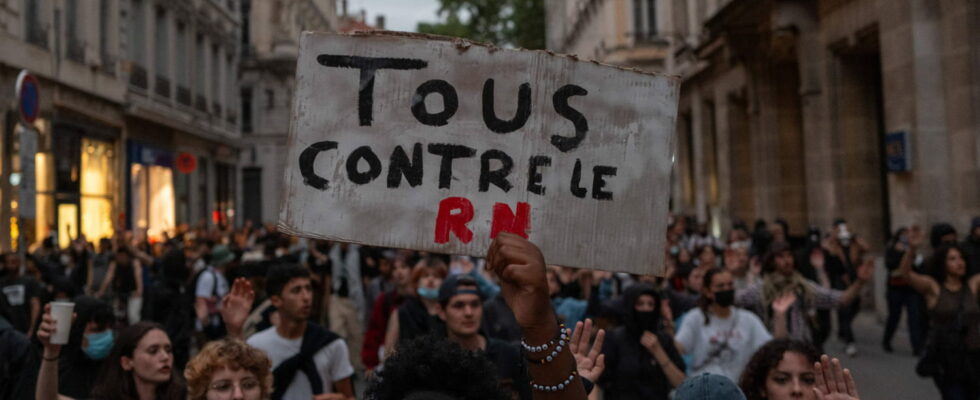The left and the majority have formed a republican front, notably by withdrawing some of their candidates to prevent the RN from winning the legislative elections. The outcome of the election now depends on the voters’ vote.
A Republican front is well and truly in place for the second round of the legislative elections. The proof is in the more than 210 withdrawals counted before the official filing of candidacies which was planned for the evening of July 2. Within the New Popular Front (NFP) as in the presidential majority, the candidates who came in third place in the first round of voting have mostly withdrawn: 132 for the left and 83 for the presidential camp according to the count of the WorldThe withdrawals were logically accompanied by calls to vote against the National Rally (RN) and in fact for the party remaining in the second round duel.
From more than 300 triangular contests announced for the second round of the legislative elections, this number has dropped to only 94. Unlike the number of duels which has increased from 190 to 405, most often between the RN and the NFP or the RN and the presidential majority. The objective is clear: to prevent the RN from obtaining an absolute majority in the National Assembly at the end of the legislative elections. The far-right party came out on top in the first round with 33.15% of the vote, and in 297 constituencies out of 577, and if it had a chance of confirming its victory in triangular contests in these territories, it will have a harder time asserting itself if the electorates of the other two blocs block it.
Some exceptions to the Republican front
While the overwhelming majority of left-wing and majority candidates withdrew when they came in third place on the evening of Sunday, June 30, a few personalities did not participate in the Front République. The New Popular Front has 6 holdings in triangular races, while the Ensemble coalition has 15. But in the twenty or so constituencies concerned, the RN only came out on top in 4 of them according to the count of the World.
On the left, some of the holdings can be explained by the LFI’s instruction to withdraw only when the RN came out on top; the rebellious Cédric Briolais thus decided to hold on in the 10th constituency of Yvelines where the minister Aurore Bergé came out on top in the first round, for example.
While within the majority, the retentions respond to the strategy of “neither RN nor LFI” notably defended by Edouard Philippe, the leader of the Horizons party. Most of the candidates of the majority who refused to withdraw believe they are facing left-wing candidates, most often rebellious, who are “against the Republic” in their eyes. This is the case for the candidacy of Louis Boyard in Val-de-Marne, against which a member of the majority maintained his position.
Republican front supported by voters?
The republican front put in place by the political actors and candidates for the legislative elections, the outcome of the legislative elections is now in the hands of the voters. Will the French voting for the left or for the presidential majority in turn support the barrier built against the National Rally? A survey conducted by Ipsos on the evening of the first round shows a certain reluctance on the part of voters to withdraw their party’s candidates, but some of them say they can block the RN by voting for another political family.
Among left-wing voters, 34% say they are in favor of the left’s withdrawal to block the RN, but 51% prefer to see the NFP candidate remain in the event of a three-way race. As for Macronist voters, 53% want the presidential candidate to remain in a three-way race, but 21% support a withdrawal only if the left is not represented by LFI and 8% want a withdrawal regardless of the candidate capable of beating the far right.
Despite these positions expressed after the announcement of the results of the first round of the legislative elections, the voting instructions may have made their way to “a majority of voters from the three main blocs [qui] will follow their party’s voting instructions” according to the analysis of Odoxa president Gaël Sliman in The Midi DispatchThe deputy general director of Ipsos, Brice Teinturier, also believed that the withdrawals and therefore the republican front should “work rather against the RN”.
The vote of the right-wing and majority voters decisive?
The New Popular Front is convinced that these voters will follow its voting instructions and support the candidate opposed to the RN in all constituencies, regardless of their political family. The left has already proven its loyalty to the Republican Front by supporting Emmanuel Macron in the second rounds of the last two presidential elections against Marine Le Pen.
The vote of the right-wing voters, on the other hand, is less certain. Firstly because the Republicans of the historic channel did not give any voting instructions other than to support their candidate when he qualified for the second round of the legislative elections. Then, because the conclusion of an alliance between Eric Ciotti and the National Rally, although disapproved by the majority of the party members, may give the impression of a simpler rapprochement between the ideas of the right and those of the extreme right rather than with those of the presidential majority – even if a part of the right-wing electorate has slid towards the Macronist camp in recent years. This porosity between the majority and the right could in a certain number of cases gather the votes behind Emmanuel Macron’s camp, but due to the disappointment of certain voters after the mandates of the head of state, could it not make them slide towards the RN? These votes will undoubtedly be decisive for the outcome of the election.
